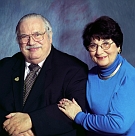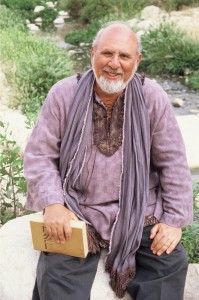[This is the eighth article in the series of God Moments in My Publishing Life.]
What happens when an innovative evangelistic product offends the sensibilities of influential people? In the late 1960s the editorial team at Moody Press became an active proponent of a creative evangelistic and discipling tool, a magazine they called Emit, Time spelled backwards. It purported to have been published during the last year or so of Jesus’ life, including news reports on Jesus trial, crucifixion and resurrection. After it was released to bookstores, it so offended an influential, very conservative leader that he descended on the president and demanded Emit be killed and all copies destroyed. During the uproar both the editor and the advertising manager resigned—opening the door for my hiring as editor two years later. Personal taste set back the missions program of Moody Press for two years.
Several years after I became editor at Moody Press I discovered an amazing evangelistic tract series called broadsides, developed by an extraordinarily creative team at Jews for Jesus. As one who had handed out many tracts at street corners, in our local hospital, and going door to door in communities where I co-led Vacation Bible Schools, I was intrigued. As far as I was concerned, the broadsides should not be restricted to street evangelism by Jews for Jesus missionaries, so I presented them to the editorial committee.
An Evangelistic Project Aborted
I received the go-ahead and negotiated the rights to eight broadsides. While they were on the press the same conservative leader who had blasted Emit visited the printer and in the press room saw the broadsides coming off the press. Outraged, he took samples and quickly headed for the office of Moody Bible Institute’s president, who at one time had been a chalktalk evangelist. He called my boss, Peter Gunther, and insisted the broadsides were not well enough drawn to represent the Institute through Moody Press. Rather than trash them, Moody Press gave them to Moody Literature Mission, which distributed them to evangelistic organizations, thus not sullying the reputation of Moody by their sales through bookstores worldwide.
My second encounter with a Jewish missionary activist was at the Student Expo sponsored by Campus Crusade for Christ in Dallas, TX in 1972. I came out of the hotel I was staying in one evening to a unique sight. Across the street marched an overalls-clad, somewhat portly individual, in front of a bar featuring scantily-clad women as their attraction, handing out tracts to patrons entering the bar. My journalism instincts kicked in and I crossed the street to more closely observe this phenomenon. I introduced myself to the street missionary, only to discover it was Moishe Rosen, the president of Jews for Jesus.
Sharing Your Faith Books
Several years later Moody Press was publishing a series of books on sharing your faith with people groups usually considered hard to reach with the message of Christ’s love. Not surprisingly, I approached Moishe Rosen about writing a book on How to Share Your Faith with a Jew. He gladly agreed to do it and the book was added to a series on sharing your faith with people of a variety of faith positions.
Another of those “sharing your faith” books was by a British missionary with 50 years of ministry to Muslims in North Africa. We had it evaluated by missionaries working with Muslims in several countries in the Indian sub-continent and the Far East—and all agreed it deserved to be published. Marketing remained unconvinced there was a large enough market, projecting sales of possibly 3,000 copies. I researched the potential and reported there were at least two million Muslims in the United States. My boss backed me up and we released the book How to Share Your Faith with a Muslim, with sales promptly taking off and 8,000 the first year getting into the hands of Christians eager to reach the Muslim population with the message of Jesus’ love for them.
Back to my Jewish connection. A couple of years later we had the opportunity of working with Ceil Rosen, Moishe’s wife, on a book. As I remember it, it was a book on the Passover. We released a second book by Ceil Rosen. Fifteen years later Jews for Jesus wanted a book to offer Jewish readers of an ad in major daily newspapers during Operation Desert Storm. By this time I was president of Here’s Life Publishers and he approached me about what is called an instant book. We got him a writer willing to interview Moishe, do biblical prophetic research, and write a book in two weeks, which Here’s Life editors tackled chapter by chapter as it was submitted. As I remember it, the book came off the press six weeks after being assigned to the writer.
A Remarkable Encounter
Another of my more remarkable God Moments came at the Dallas, TX Student Expo of Campus Crusade for Christ. With some time on my hands I wandered over to Crusade’s press tent, seemingly deserted at the time—until I saw a bearded younger man who definitely looked Jewish wandering around in the tent. I approached him and introduced myself. He gave me his name, Zola Levitt, and I knew my suspicion was confirmed.
Zola revealed he had been an agnostic all his adult life and had been a believer in Yeshua as the Messiah only six months. He was trying to find his way in this new world, the evangelical Christian community.
My new friend’s story revealed one God Moment after another. He had been attending a Metropolitan Opera regional contest at the Indiana University as editor of the university’s daily newspaper when his eyes fell on the most gorgeous woman he had ever seen. He told the friend to hold his seat while he sauntered over and invited the young woman for coffee. Very reluctantly she agreed.
Zola’s agnostic mindset took a hit when this beautiful young woman started sharing her faith in Jesus the Messiah with him—unknown to him, she was a trained Campus Crusade witness. He was so smitten by her he still asked her for a date—and during dates over six weeks she never wavered in her witnessing to the reality that Jesus was the Messiah. He broke off the relationship, but could not get her out of his mind, so he renewed the dating relationship. She invited him to visit her home and church, where he heard another clear message of salvation in Christ Jesus. That night he told Jesus, “If you are real, show me.” God invaded his life in such a powerful way he knew Jesus was real right now and loved him. He eventually married the young woman who had through the leading of the Holy Spirit totally ruined his agnostic belief system.
Zola showed up in my office within the next year with a book idea. We ended up publishing eight books by him, all the way from a book on touring Israel to a book on witnessing to his childhood friend through a series of letters. When he teamed up with Tom McCall, an American Board of Missions to the Jews staff member, for a book on the Third Temple, eventually entitled Satan in the Sanctuary, Moody had a genuine bestseller. They teamed up as well for The Coming Russian Invasion of Israel, which also sold at the level of a bestseller. Years later during Desert Storm they updated the book and it had a second run as a Moody Press book.
Knowing When to Compromise
Zola was not the easiest author to work with. After all, he had conducted operas, led a symphony orchestra, played an oboe and the French horn at a professional level—and been a daily newspaper reporter. He knew exactly what he wanted—and early on that clashed with our conservative managing editor. On his first book with us he was aghast that the editor had strictly followed the Chicago Manual of Style and eliminated all his contractions and other indicators of his personal style. After all, he had followed the AP Manual of Style.
Our editor refused to budge even though she was attending a Messianic Fellowship—if one author got away with it, others could as well. But Zola also refused to back down—he wanted an informal style that he believed appealed to his readers. It seemed Moody Press was about to lose a valuable acquisition—and possibly a series of books—so I asked for the galley proof. With a red pen I gave him most of what he asked for. We saved a valuable contributor to our bottom line—and thereby also contributed to Zola launching an international Bible teaching ministry.
Zola was remarkably creative. He would dress in period clothing, stand in front of a biblical site, and have movie cameras rolling as he presented his biblical message. Then he put them on television. He wrote, composed, and directed in live performances of his cantata, gave tours of Israel, building a television ministry that eventually reached every state in the nation—and attracted an international following. The sale of his books, the tours he led to Israel, his speaking engagements, provided a source of income that supported his television ministry and relieved him of constant appeals for financial support.
The next installment will tackle a range of author and work experiences at Moody Press that created an environment leading to a far-reaching decision based on a God Moment.





I enjoyed this installment very much Les, and our breakfast together too.
I had no idea that you had a God moment with Zola Levitt!